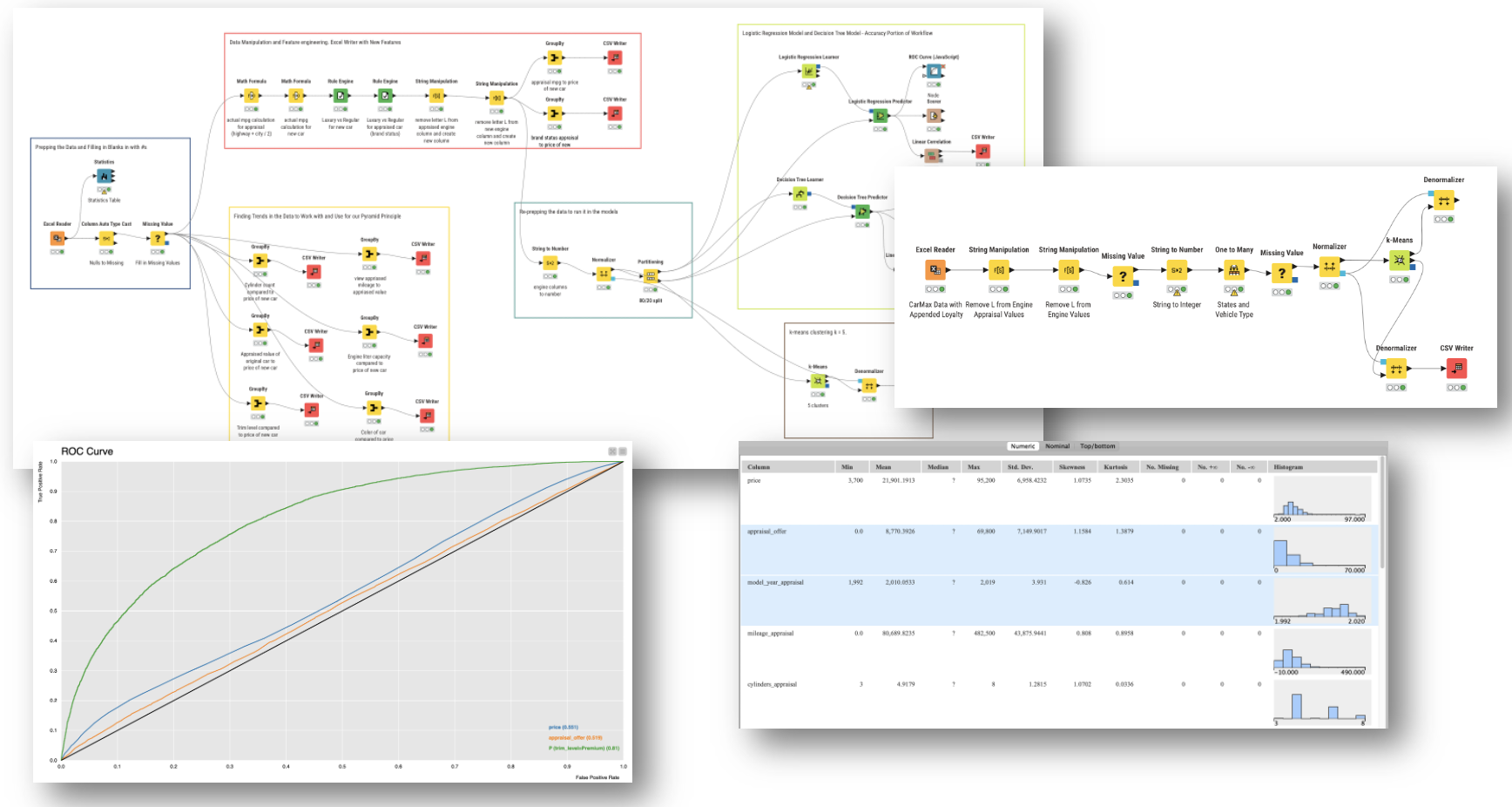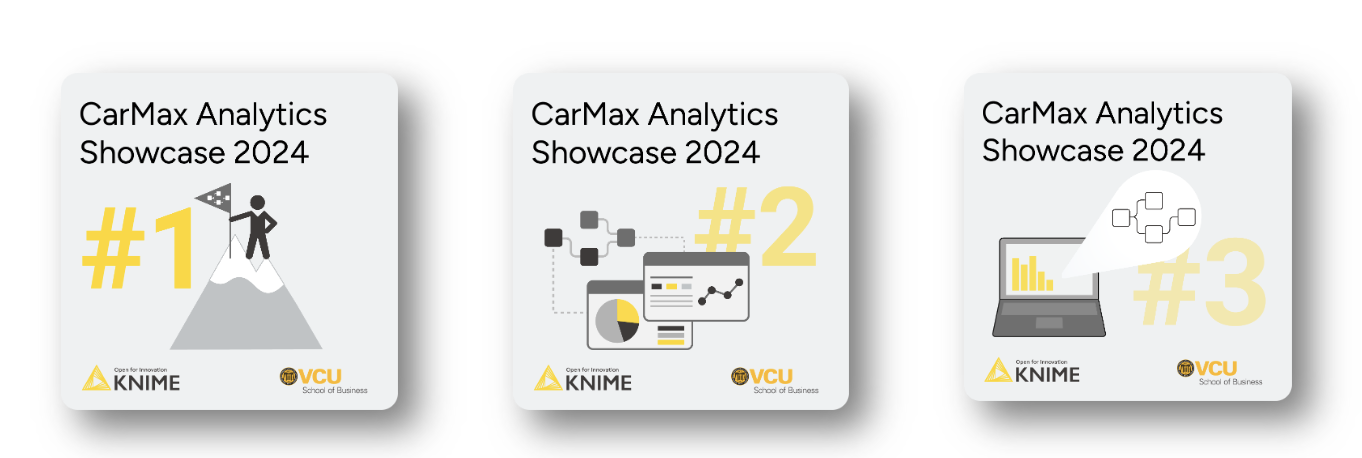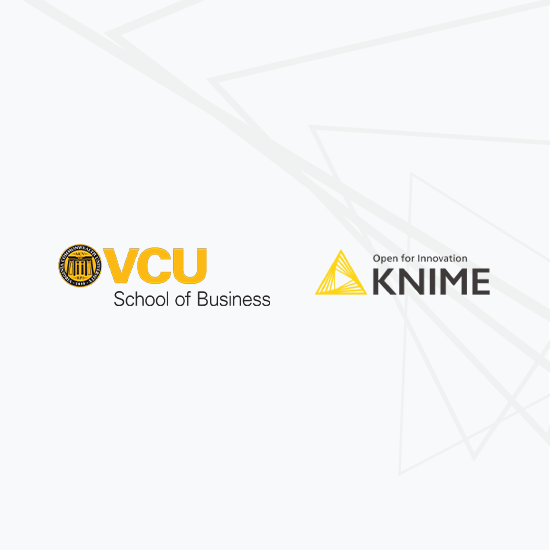Many customers choose to trade in their current vehicles when buying a new one. This inspired Professor Cipollato to challenge his Business Intelligence and Data Mining students with the question: what does a customer’s appraised vehicle tell us about the vehicle they will end up purchasing?
As the largest used-car retailer in the United States, CarMax has redefined car buying and selling since its founding in 1993. Known for no-haggle pricing, quality-certified vehicles, and transparent appraisals, CarMax prioritizes customer satisfaction with personalized shopping experiences and seamless trade-ins.
To tackle this question, students worked with a real dataset from CarMax. Their goal was to apply their findings to improve business operations and provide customers with a personalized shopping experience.
Congratulations to the “CarMax Analytics Showcase” student challenge winners, organized by Professor Joe Cipolla from Virginia Commonwealth University (VCU)!
KNIME’s Educators Alliance collaborates with educators to run student challenges and bring gamification into teaching data science. The challenges take the form of a project, executed individually or in teams, and the best solutions are recognized by an award. Rooted in real-world data, the challenges foster collaboration and constructive competitiveness between learners. This gamification approach to learning helps beat the content-forgetting curve and equips learners with solid knowledge of data analytics – a skill that remains relevant even after they are done with their degrees.
Notes on the Data Used
In this challenge, students analyzed a real dataset comprising approximately 130,000 customers who had purchased a car from CarMax in the past, along with their appraisal details. Often, CarMax customers use the appraisal offer to purchase another vehicle through a trade-in.
The dataset shared with Cipolla’s students contains information on customers’ appraised vehicles, and on the vehicles they purchased from CarMax. Vehicle attributes mined by the students for purchased and appraised cars, including features like make, model, trim, mileage, appraisal value, and purchase value.
The road from challenge kick-off to winning podium
Professor Cipolla had envisioned this challenge even before we opened a call for applications early in 2024. After his proposal was accepted, the collaboration began with a panel discussion about ideas and approaches for this project. Professor Cipolla discussed these topics with KNIME’s Aline Bessa and Stefan Helfrich in a session recorded for the students in his class.
Cipolla’s class was divided into two sections, with students working in teams of four. Throughout the Spring 2024 semester, they learned and practiced data preparation and predictive analytics skills to figure out how different features of customers’ original cars related to the vehicles they ended up purchasing.
By the end of the semester, the teams turned in their KNIME workflows, presentation videos, and reports, highlighting their findings and proposing data-based improvements for business operations.
After evaluation, six teams – three per class section – stood out:
- In the first place, Arthur Mendonca Feu, Zahira Hernandez, Noah Yedigarian, and Mason Dickhute (section 01); and Leah Richardson, Sahil Dixit, Rashid Nasir, and Mohit Kumar (section 02)
- In the second place, Jordan Hopkins, Brandon McCarter, Heather Robertson, and Jared Williams (section 01); and Hanza Ababneh, Lisa Quach, Andrew Slobodnik, and Ivy Solis (section 02)
- In third place, Yafet Asfaw, Ramy Khalefa, Matthew Taleghani, and Long Thai (section 01); and Peter Gudgel, Matthew Guthrie, Mohamed Mohamed, and Fawwaz Shahid (section 02).
Winning solutions
Using predictive machine learning to boost CarMax’s revenue
Arthur Mendonca Feu, Zahira Hernandez, Noah Yedigarian, and Mason Dickhute used predictive machine learning models to come up with recommendations to boost CarMax’s revenue.
By accurately predicting what vehicle categories customers are more likely to purchase, CarMax could refine customer targeting and improve sales accuracy. The students also noticed a growing demand for high-performance vehicles and regional preferences, which can guide marketing efforts and help align inventory with local demands.
Segmenting customers with clustering techniques
Leah Richardson, Sahil Dixit, Rashid Nasir, and Mohit Kumar clustered customer preferences for states with high customer demand, which suggested that managing vehicle inventory, including vehicle make and model, could increase CarMax’s sales significantly. Optimizing engagement by advertising directly to customer preferences, based on vehicle color and type per cluster, also has the potential to increase sales.
Hanza Ababneh, Lisa Quach, Andrew Slobodnik, and Ivy Solis also used clustering techniques to uncover vehicle purchasing patterns. Their data-based recommendations include altering the appraisal process to be more selective with respect to accepted car colors, and constantly refreshing the colors available on lots. Moreover, CarMax could limit its validation period for appraisals to just one week, incentivizing purchases in that period since this is when most customers are actively buying vehicles.
Yafet Asfaw, Ramy Khalefa, Matthew Taleghani, and Long Thai used both clustering techniques and predictive analytics to uncover customer preferences and vehicle purchase patterns. They recommend enhancing stock levels of popular vehicle types like small SUVs, pickups, and medium SUVs in areas with high trade-ins. Furthermore, the shift away from larger-engine vehicles suggests a growing consumer interest in more economically or environmentally friendly models: increasing the availability of fuel-efficient, smaller-engine models can thus cater to this trend.
Finally, Peter Gudgel, Matthew Guthrie, Mohamed Mohamed, and Fawwaz Shahid also segmented customers based on their vehicle preferences and purchase history using clustering techniques. They found out three three significant trends among customers: an interest in fuel efficiency, brand loyalty, and budget considerations. By leveraging the specific needs and preferences of different people, CarMax could optimize its advertisement campaigns and exceed customer expectations. This could in turn foster more brand loyalty and increase sales.
Data exploration to reveal purchase trends and patterns
Jordan Hopkins, Brandon McCarter, Heather Robertson, and Jared Williams analyzed trends and patterns in the data and found that CarMax could increase its revenue by about 0.5% by focusing on customer appraisal and purchasing trends in different US areas. In other words, CarMax should adjust its inventory and optimize its marketing efforts to match local buyer demands.

The winners are awarded digital badges acknowledging the quality of their work, coupon codes to get all KNIME certifications for free, custom-made trophies, and an assortment of KNIME gadgets.

A successful student challenge collaboration
The CarMax Analytics Showcase challenge was an opportunity for students to learn more about low-code and data science. We would like to congratulate all students who participated and used KNIME in their projects and thank Professor Cipolla for his interest in using KNIME for teaching. Here’s to more collaborations with VCU!
About VCU’s School of Business
VCU's School of Business is at the intersection of business and innovation. It aims to develop world-ready business leaders and produce game-changing research.
Since its establishment in 1937, the VCU School of Business has grown into a nationally ranked institution with over 40,000 alumni making significant contributions across industries.
Recognized among the top five percent of business schools worldwide, thanks to its AACSB International accreditation, VCU offers a wide range of programs, including bachelor's, master's, certificate, and doctoral degrees. The school maintains strong connections with the vibrant business community that surrounds the campus and provides students with transformative educational experiences, empowering them to bridge education and success.
